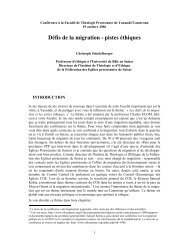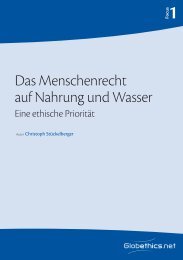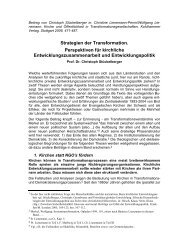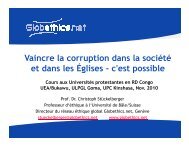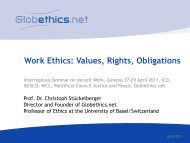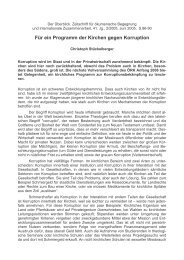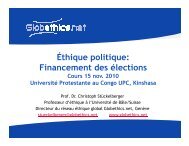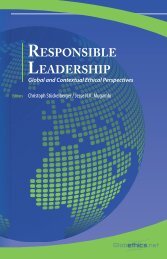BREAK THE CHAINS OF OPPRESION AND THE YOKE OF ...
BREAK THE CHAINS OF OPPRESION AND THE YOKE OF ...
BREAK THE CHAINS OF OPPRESION AND THE YOKE OF ...
Create successful ePaper yourself
Turn your PDF publications into a flip-book with our unique Google optimized e-Paper software.
PREAChing I draw attention again to Isaiah 58, the motto of the 1997 General Council in<br />
Debrecen. In historical terms, we know that the economic injustice which the<br />
prophet is attacking, was brought about by an external factor: the tax reform<br />
pushed through by the Persian King Darius I (after 521) permitted taxes to be<br />
paid only in coins. This forced the small farming businesses that were not geared<br />
up for surplus production (i.e., had nothing to sell) to go bust. They ended up in<br />
the debt trap and were ultimately swallowed up by large landowners. It is this inner-Israeli<br />
“furtherance” of an externally-imposed injustice that the prophet<br />
makes the focal point of his sermon, precisely because his concern is the healing<br />
of his people.<br />
2. This is especially relevant for the part of the sermon concerned with exposing<br />
sin: what is said here must be accurate. This appears to be self-evident, but it is<br />
not. Again and again, in sermons on ethics, it can be shown that statements are<br />
only half or three quarters true, that the research has been sloppy or that what is<br />
said is too general.<br />
This is particularly bad in our context, because factual errors make it all too easy<br />
for the congregation to also fend off criticism that is in fact justified. Particular<br />
consideration must be given to one trap (in taking up AC 11): only in exceptional<br />
and borderline cases can human co-existence be assessed by the tools of binary<br />
logic. Anti-semitism, for example, or apartheid are cases where our “either-or”<br />
is required. More often, however, it is a matter of bringing the conflicting values<br />
into balance, instead of deciding in favour of the one and against the other; and<br />
hence in the economy, for example, it is a matter of finding the balance between<br />
the poles of public welfare and self-interest and not a matter of contradictory<br />
principles.<br />
One other example �relates � to the �use of “we” in �statements � on the issue of justice.<br />
According to the particular context, I am perpetrator, victim, co-participant, cosufferer,<br />
co-originator, co-injured party, etc. But I am not always everything at<br />
any one time, and that is why, from case to case, it is important to question precisely,<br />
to talk precisely. An indiscriminating “we” seduces me and those listening<br />
to me to seek refuge on the agreeable side. Talking precisely also requires courage<br />
to confess along with Peter at the given moment: I am a sinful man (Luke 5:8),<br />
or to say with Nathan: You are the man (2 Sam 12:7).<br />
3. Finally: in the part of the sermon exposing sin, the task again and again will be<br />
to draw attention to the misery of the particularly disadvantaged and to raise<br />
awareness for their suffering. This cannot be done through statistics alone, no<br />
matter how terrible they are. They are invaluable as information for the congregation,<br />
but statistics on many thousands of victims cannot be felt. I am more<br />
likely to be moved by what has happened to an individual. In such an example<br />
the unimaginable is made vivid and the demands on me cannot be rebuffed.<br />
��������������������������������������������<br />
� � � ��������������������<br />
�<br />
�<br />
– PREACHING ON JUSTICE – 19



